BLACK MIRROR, 6.5 – ‘Demon 79’
A meek sales assistant is told she must commit terrible acts to prevent disaster.
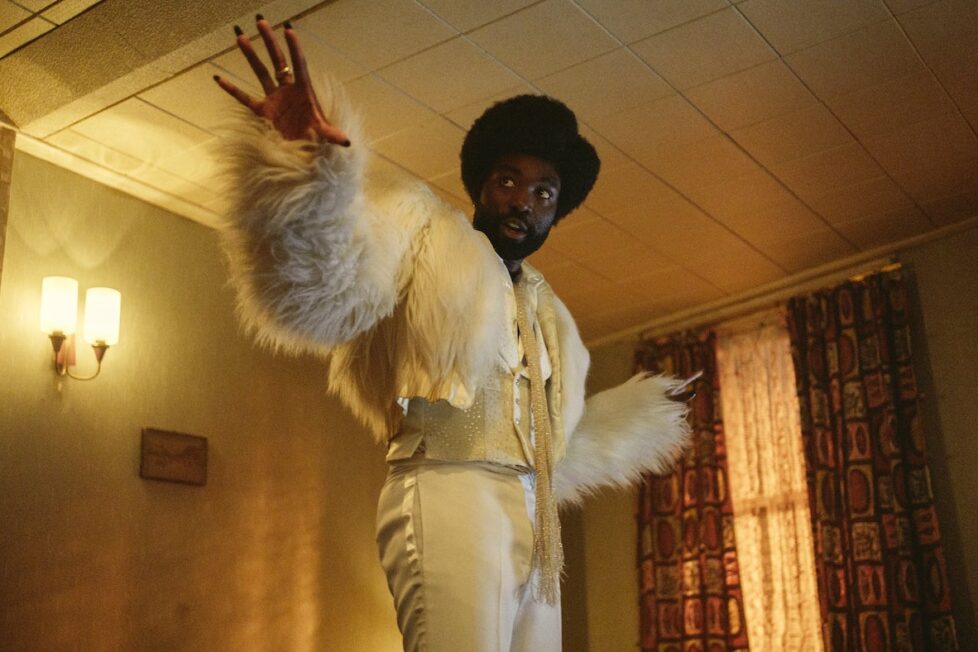
A meek sales assistant is told she must commit terrible acts to prevent disaster.


Since inception, Black Mirror‘s been an anthology series exploring the consequences of technology. So although creator Charlie Brooker’s experimented with genre conventions, the show has been synonymous with technophobia. Series 6’s “Joan is Awful” hilariously critiqued the future of streaming, whereas “Mazey Day” explored the relentless and exploitative nature of paparazzi. However, instead of serving as a cautionary tale about the potential dangers of technology, “Demon 79” redefines the parameters of the series. Differentiating itself as a ‘Red Mirror’ production, the finale to Black Mirror’s sixth series eschews technological satire in favour of supernatural horror.
Taking place during an unsettling period in northern England, the episode centres around the young sales assistant, Nida (Anjana Vasan). She works for a department store and is constantly subjected to racism because society is highly hostile toward her South Asian heritage. It’s 1979 and the racist National Front party has begun violently protesting in the streets against immigration, while Conservative politician Michael Smart (David Shields) obfuscates his own fascist rhetoric by demanding local change. Due to an impending election, tensions begin to rise and Nida is even harassed by her own colleague Vicky (Katherine Rose Morley), who openly reads anti-immigration pamphlets and complains about the smell of the Indian food Nida has for lunch.
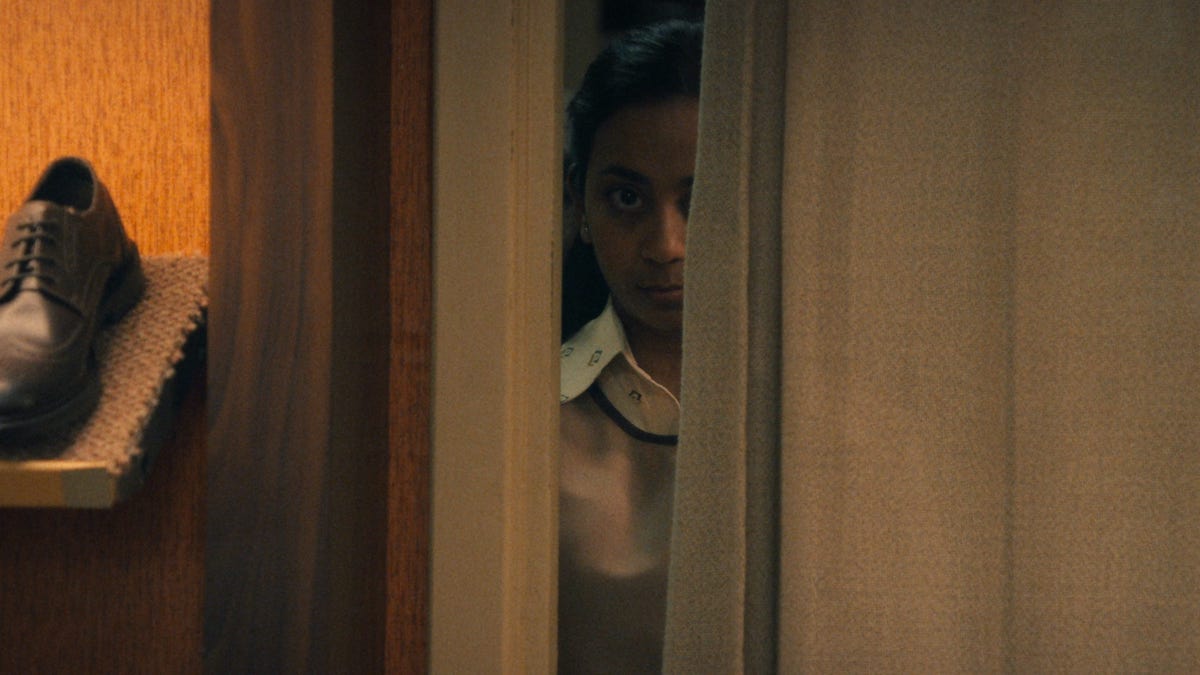
After being banished to the department store’s basement to eat her food, Nida seethes with repressed rage before discovering several items that apparently belonged to the founder of the store—amongst them a collection of newspaper clippings and a strange talisman with a mysterious engraving. After accidentally anointing the latter with her own blood, Nida unleashes a charming demon named Gaap (Paapa Essiedu), who explains she’s now bound to the talisman and must commit three human sacrifices within the next three days. And if she fails her assignment an apocalypse of Biblical proportions will be unleashed upon the world and Gaap will be banished to an unknowable cosmic void. Reluctantly, Nida agrees to the demon’s demands and embarks on her mission with Gaap as her invisible mentor.
The episode is anchored by Anjana Vasan’s (We Are Lady Parts) empathetic performance as Nida. The actress effortlessly imbues her character with emotional vulnerability while conveying the moral complexities faced by her character. The weight of saving the world versus committing acts of murder is something she actively struggles with. Her unassuming demeanour suggests a desperately isolated woman in an era where National Front protestors are stirring up racist hatred… however, beneath her reticent exterior is a traumatised woman on the verge of collapse. Vasan’s large and expressive eyes evoke Nida’s hidden depths of fury. Her occasional intervals into satisfying violent fantasies communicate the psychological torment of living in an unwelcoming world.
However, Papa Essiedu (Men) steals the show by providing welcome comic relief as the flashy and oddly endearing demon. An incredible talent with an exciting range, Essiedu imbues Gaap with a subtle charm and wicked comedic sensibilities. His actual hellish appearance is too frightening for human eyes, so he quickly eschews the traditional look of a demon by presenting himself as Boney M.’s frontman Bobby Farrell. Dressed in white flared trousers, platform boots, and a furry coat, Essiedu’s astonishing to watch. His comedic timing is razor-sharp as he fires off hilarious lines, such as “looks like he wipes his arse with his house.”
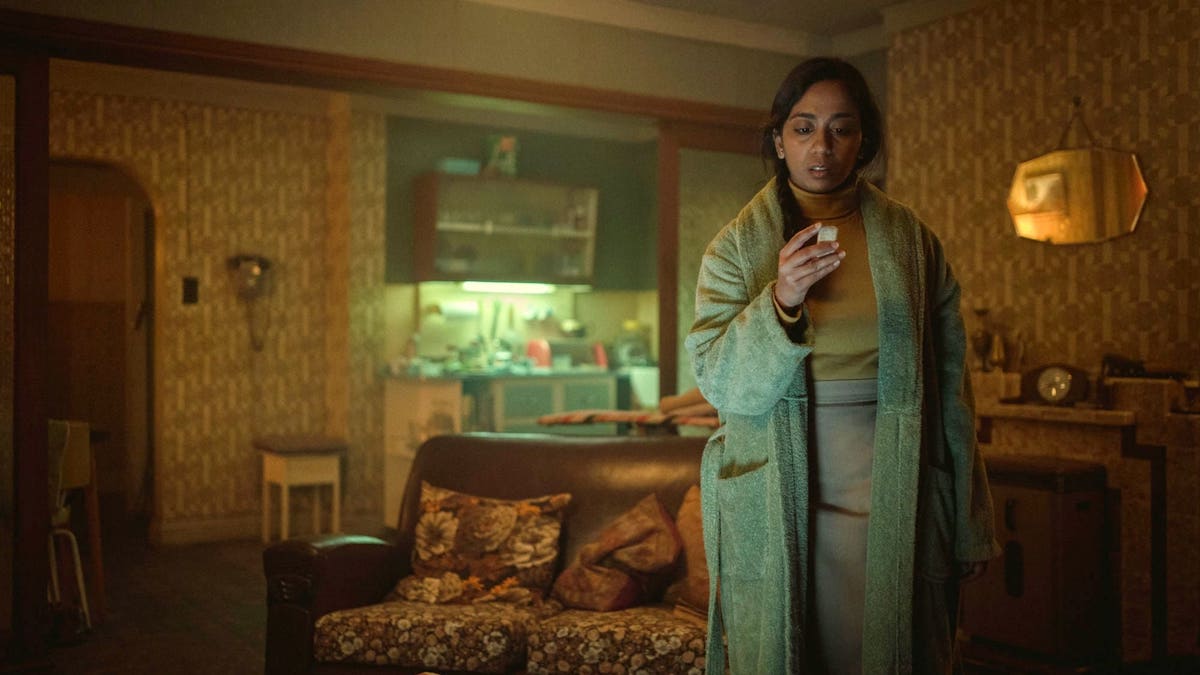
Following the success of Series 4’s exciting space opera “USS Callister”, director Toby Haynes returns to helm this deliciously dark supernatural tale. “Demon 79” is the most delightfully gruesome and highly stylised episode of Black Mirror thus far. Once Nida becomes comfortable with her assignment, the kills are neither straightforward nor simple. Blood splatters everywhere when she bludgeons victims with a hammer, and Haynes’ strong visual and auditory choices retain an incredible command of style as he leans into the 1970s horror aesthetic. The director incorporates a dramatic operatic score, sinister lighting, and artificial scratches to homage to the video nasties of the era. The episode is undoubtedly indebted to the Italian genre specialists but the combination of supernatural horror and kitchen-sink melodrama evokes Peter Strickland’s In Fabric (2019).
While garnished with perfect amounts of supernatural horror, Charlie Brooker and Bisha K. Ali’s (Ms. Marvel) screenplay is essentially a macabre buddy comedy drama. Most of the dark humour derives from Gaap attempting to teach Nida how to become an efficient murderer, as it’s revealed the demon can only earn his satanic wings by completing an initiation (convincing a human to commit murder three times). As Gaap coaches Nida through a series of homicides, the episode transforms into a satirical inversion of It’s a Wonderful Life (1946). Gaap’s ability to glimpse into the future and look into people’s souls also provides plenty of great moments. Brooker’s unique nihilistic British humour and Ali’s history as a stand-up comic create some hilarious moments. “Demon 79” is easily one of the most rewatchable episodes of the series.
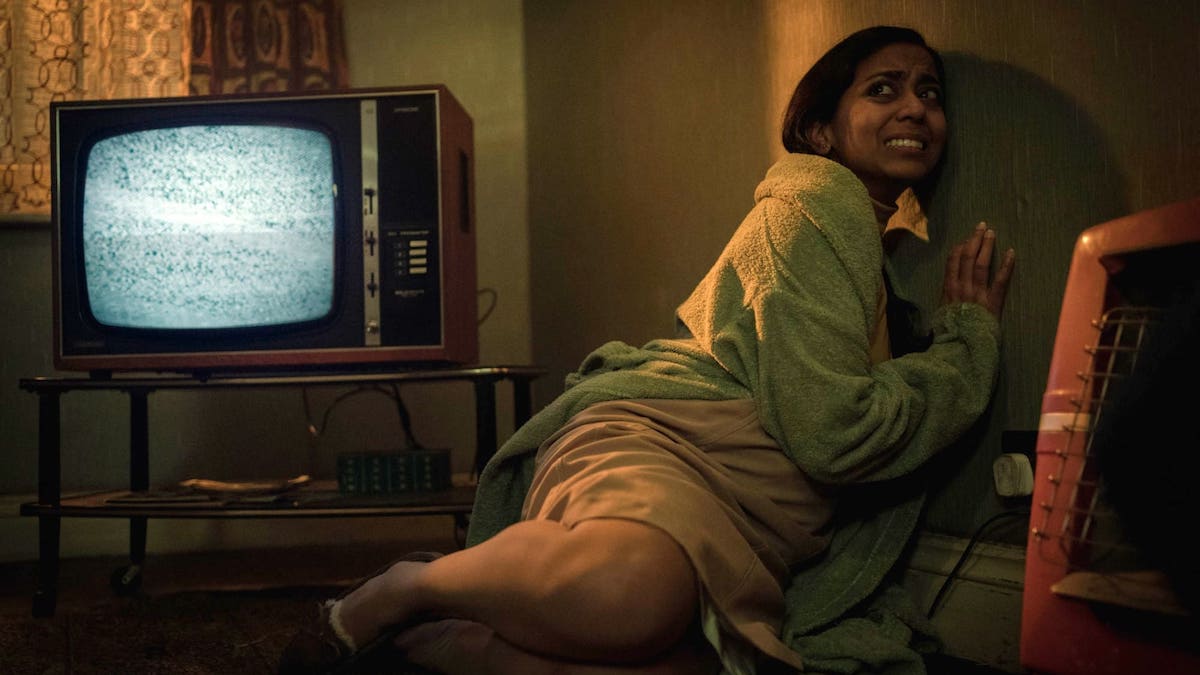
Although the premise would be more suitable for an anthology series, like Guillermo del Toro’s Cabinet of Curiosities (2022), “Demon 79” remains somewhat faithful to the Black Mirror formula. Brooker’s scathing social commentary underpinning the proceedings draws distinct parallels between the politics of the 1970s and the burgeoning politics of post-Brexit Britain. The episode effectively captures the atmosphere and social climate of the decade, highlighting the tensions surrounding immigration and political unrest. Nida experiences mistreatment and alienation from her work colleagues, whereas the omnipresent newspaper headlines suggest the white supremacist group National Front is gaining popularity.
Michael Smart is a Tory who secretly supports the policies campaigned by the National Front, so when Nida asks to see Smart’s future she discovers his fascist regime eventually prompts the destruction of the country. Presented against the backdrop of a real election that had tremendous implications for the future of the UK, Brooker suggests we should take responsibility for who we elect and the greater impact they have on society. If we keep appointing immoral leaders masquerading as the face of palatable civility, a societal collapse will be inevitable and “eternal oblivion” is the lesser of two evils. Black Mirror has previously provided glimpses into our future but this episode warns its audience to heed the lessons of past mistakes.
Overall, “Demon 79” offers an intriguing blend of supernatural horror and social commentary. Fans of Brooker’s technological satire may be disappointed the episode intentionally diverts from Black Mirror’s traditional identity. However, the climax mines the pessimism of classic episodes like “White Christmas”. It challenges our perceptions and forces the audience to confront uncomfortable truths about humanity’s insidious nature.
UK | 2023 | 74 MINUTES | 16:9 HD | COLOUR| ENGLISH

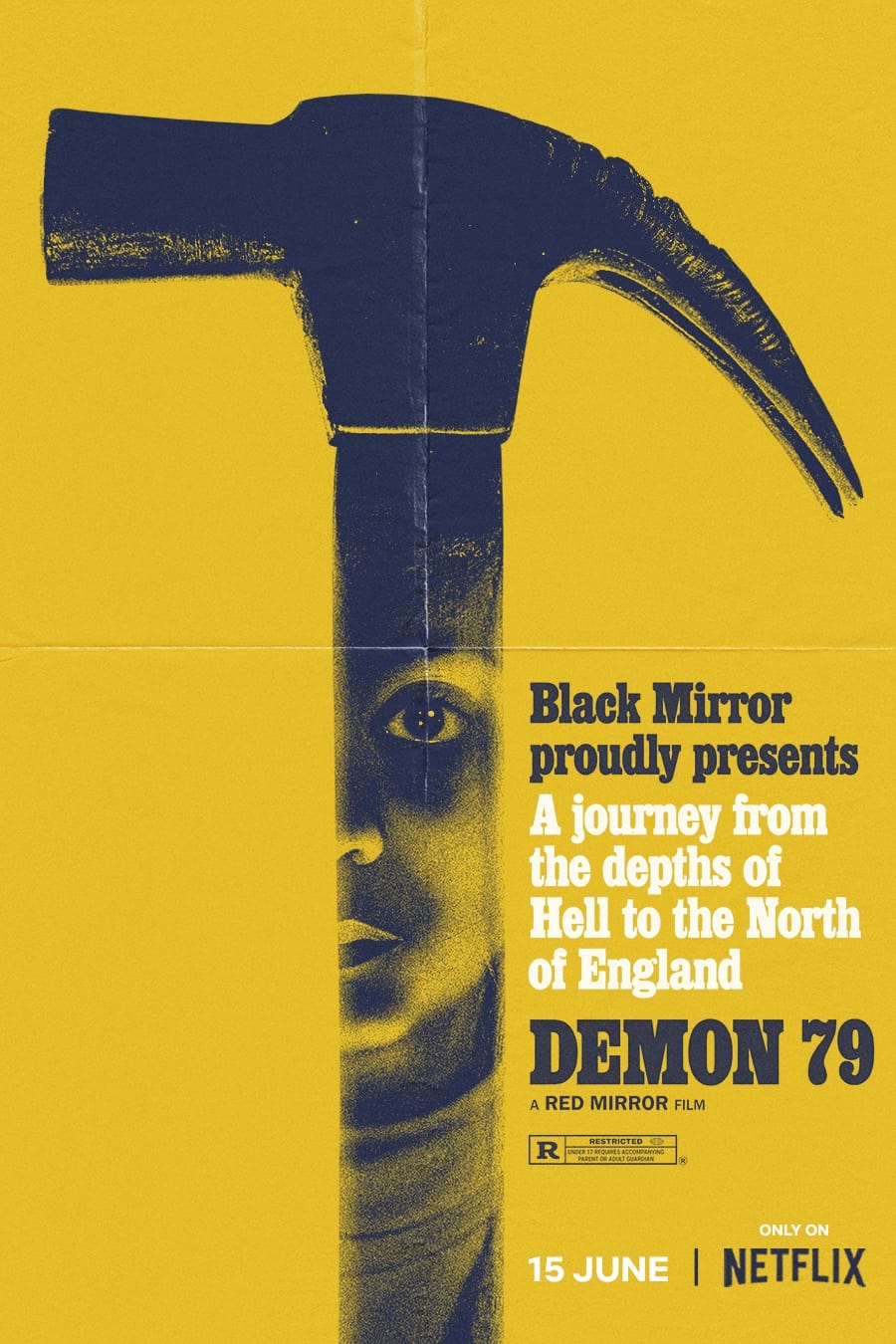
writers: Charlie Brooker & Bisha K. Ali.
director: Toby Haynes.
starring: Anjana Vasan, Paapa Essiedu, Katherine Rose Morley, David Shields, Nicholas Burns, Shaun Dooley, Emily Fairn & Joe Hughes.
